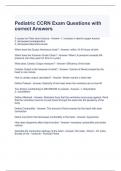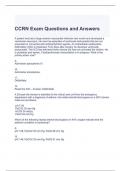Ccrn exam questions - Study guides, Class notes & Summaries
Looking for the best study guides, study notes and summaries about Ccrn exam questions? On this page you'll find 755 study documents about Ccrn exam questions.
Page 3 out of 755 results
Sort by
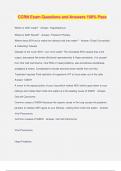
-
CCRN Exam Questions and Answers 100% Pass
- Exam (elaborations) • 53 pages • 2024
- Available in package deal
-
- $13.49
- + learn more
CCRN Exam Questions and Answers 100% Pass Where is ADH made? - Answer- Hypothalamus Where is ADH Stored? - Answer- Posterior Pituitary Where does ADH act to make the kidneys hold onto water? - Answer- Distal Convoluted & Collecting Tubules Disease of too much ADH = too much water! The increased ADH causes less urine output, decreased Na levels (dilutional hyponatremia) & Hypo-osmolarity. It is caused from Oat Cell Carcinioma, Viral PNA or head problems, also sometimes anesthesia, analges...
Pediatric CCRN Exam Questions with correct Answers (Graded A)
CCRN PEDS AACN EXAM QUESTIONS WITH COMPLETE SOLUTIONS
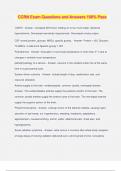
-
CCRN Exam Questions and Answers 100% Pass
- Exam (elaborations) • 39 pages • 2024
- Available in package deal
-
- $13.49
- + learn more
CCRN Exam Questions and Answers 100% Pass SIADH - Answer- increased ADH level, holding on to too much water, dilutional hyponatremia. Decreased osmolarity=hypoosmolar. Decreased urinary output. CSF normal protein, glucose, WBCs, specific gravity, - Answer- Protein <100, Glucose: 70 WBCs: 4 cells/mm2 Specific gravity 1.007 Poikothermia - Answer- fluctuation of core body temperature of more than 2° C due to changes in ambient room temperature pathophysiology of a seizure - Answer- neuro...
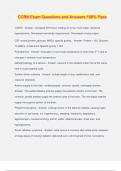
-
CCRN Exam Questions and Answers 100% Pass
- Exam (elaborations) • 39 pages • 2024
- Available in package deal
-
- $13.49
- + learn more
CCRN Exam Questions and Answers 100% Pass SIADH - Answer- increased ADH level, holding on to too much water, dilutional hyponatremia. Decreased osmolarity=hypoosmolar. Decreased urinary output. CSF normal protein, glucose, WBCs, specific gravity, - Answer- Protein <100, Glucose: 70 WBCs: 4 cells/mm2 Specific gravity 1.007 Poikothermia - Answer- fluctuation of core body temperature of more than 2° C due to changes in ambient room temperature pathophysiology of a seizure - Answer- neuro...
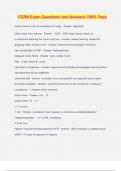
-
CCRN Exam Questions and Answers 100% Pass
- Exam (elaborations) • 24 pages • 2024
- Available in package deal
-
- $12.49
- + learn more
CCRN Exam Questions and Answers 100% Pass most common entry for microbes into lungs - Answer- aspiration initial output from ostomy - Answer- > large volume liquid out to determine teaching the nurse must first - Answer- assess learning needs first grasping reflex normal or no? - Answer- shows cortical damage to the brain late complication of SAH - Answer- hydrocephalus Glasgow Coma Scale - Answer- eyes, verbal, motor Max- 15 pts, below 8= coma obtunded vs stuporous - Answer- stuporou...
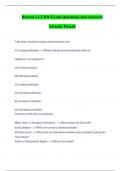
-
Barron's CCRN Exam Questions and Answers Already Passed
- Exam (elaborations) • 21 pages • 2023
- Available in package deal
-
- $12.49
- + learn more
"high dose" dopamine causes vasoconstriction and (C) Increase afterload - What is the primary hemodynamic effect of: Dopamine >10 mcg/kg/min (A) Increase preload (B) Decrease preload (C) Increase afterload (D) Decreased afterload (E) Increase contractility (D) Decrease contractility Pulmonary HTN and cor pulmonale; Mitral, aortic, or tricuspid insufficiency - What causes the S3 sound? during diastole - When are coronary arteries perfused? S3 heart sound - What may you hear befor...
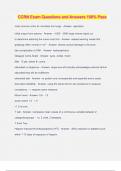
-
CCRN Exam Questions and Answers 100% Pass
- Exam (elaborations) • 24 pages • 2024
- Available in package deal
-
- $13.49
- + learn more
CCRN Exam Questions and Answers 100% Pass most common entry for microbes into lungs - Answer- aspiration initial output from ostomy - Answer- > large volume liquid out to determine teaching the nurse must first - Answer- assess learning needs first grasping reflex normal or no? - Answer- shows cortical damage to the brain late complication of SAH - Answer- hydrocephalus Glasgow Coma Scale - Answer- eyes, verbal, motor Max- 15 pts, below 8= coma obtunded vs stuporous - Answer- stuporou...
CCRN Exam Questions and Answers
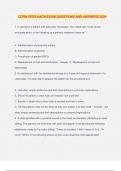
-
CCRN PEDS AACN EXAM QUESTIONS AND ANSWERS 2024
- Exam (elaborations) • 54 pages • 2024
- Available in package deal
-
- $13.49
- + learn more
CCRN PEDS AACN EXAM QUESTIONS AND ANSWERS 2024 1. In caring for a patient with salicylate intoxication, the critical care nurse would anticipate which of the following as a primary treatment measure? A. Administration of protamine sulfate B. Administration of glucose C. Transfusion of packed RBCs D. Replacement of fluid and electrolytes - Answer- D. Replacement of fluid and electrolytes 2. An adolescent with the developmental age of a 4-year-old requires placement of a chest tube. The b...

How much did you already spend on Stuvia? Imagine there are plenty more of you out there paying for study notes, but this time YOU are the seller. Ka-ching! Discover all about earning on Stuvia

